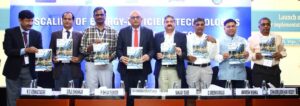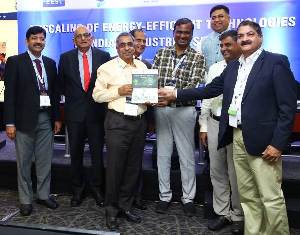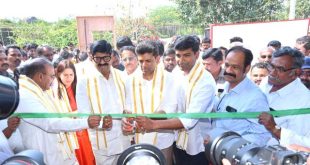
-Experts Call for Industrial Leadership in Embracing Innovative Energy Solutions to Curb Emissions and Enhance Competitiveness
-ADEETIE and PAT Schemes Propel India’s Sustainable Industrial Growth with Significant Energy Savings”
-Key Stakeholders Applaud Efforts in Andhra Pradesh and Telangana for Advancing Energy Efficiency Initiative
-EESL Highlights Successful Energy Programs, Urges Industries to Adopt Next-Gen Efficiency Technologies
Vijayawada, Neti Patrika Prajavartha :
Energy Efficiency Services Limited (EESL), a joint venture of public sector undertakings under the Ministry of Power, in collaboration with the Bureau of Energy Efficiency (BEE), Ministry of Power, Government of India, and Confederation of Indian Industry (CII) successfully hosted a landmark workshop aimed at accelerating the adoption of energy-efficient technologies in India’s industrial sector.
The workshop is part of the ongoing national initiative, ‘Creating and Sustaining Markets for Energy Efficiency,’ under the Global Environment Facility (GEF-6) cycle. This project, which began in 2018, is implemented by the United Nations Environment Programme (UNEP) and the Asian Development Bank (ADB), with EESL serving as the executing agency and the International Institute for Energy Conservation (IIEC) as the co-executing agency. The project focuses on deploying cutting-edge energy-efficient technologies to curb greenhouse gas (GHG) emissions.
Key technologies discussed during the workshop included waste heat recovery systems, advanced compressed air solutions, energy-efficient cooling mechanisms, turbo blowers, IE4 motors with VFDs, microturbines, and industrial automation. These innovations represent the forefront of energy efficiency, offering transformative solutions to reduce operational costs and mitigate environmental impacts in industries across India.
Shyam Sunder, Director at BEE, outlined BEE’s mission in steering India’s industries towards energy efficiency and climate change mitigation. He stressed the need for industries to adopt advanced technologies despite perceived risks, positioning these efforts as crucial to sustainable development.
During the event, Ravichandran Purushothaman, Chairman. Energy Efficiency. and Venkatagiri, Executive Director, CII, emphasized the critical role industries must play in embracing new technologies. “Industries must lead the way by adopting energy-efficient solutions to drive operational excellence while minimizing environmental footprints,” he stated. He also called on industry leaders to foster collaborations and partnerships that would sustain long-term growth and competitiveness in the face of evolving market dynamics.
Syam Sunder Director .BEE further .highlighted the ADEETIE (Accelerating Demand for Energy-Efficient Technologies in Industrial Enterprises) scheme initiated by BEE. This program promotes energy-saving solutions through industry collaboration, capacity-building programs, and direct support. ADEETIE, alongside the well-known Perform, Achieve, and Trade (PAT) scheme, is pivotal in driving India’s energy efficiency goals forward, particularly in fast-growing industrial hubs like Hyderabad, Chennai, Bengaluru, Visakhapatnam, Vijayawada, and Trivandrum.
Animesh Mishra CGM Sales and Communications EESL disclosed that Plants located for demonstration located in South India are as follows ..NSL TEXTILES LIMITED Inkollu, (Andrha Pradesh), NSL Textiles Limited Edlapadu, (Andhra Pradesh ), CCI Limited, Tandur, (A.P), HRG Alloys & Steel PVT Ltd, Karnataka, Seshasayee Paper and Boards, Erode, Tamil Nadu, Orient Cement Limited, Karnataka, and Minera steel and Power Pvt Ltd, Karnataka
Animesh Mishra, reinforced the importance of energy efficiency as a highly cost-effective energy source. He detailed EESL’s impactful initiatives, which have delivered significant climate and financial benefits for industries and communities. “Energy efficiency is the most cost-effective resource, yielding dual benefits for both the environment and the bottom line,” he remarked.
Girja Shankar, General Manager (Technical) at EESL, provided insights into the company’s portfolio of 11 energy-efficient technologies, of which 9 have been validated for industrial use. These technologies, including Waste Heat Recovery Systems (WHRS), IE4 motors, and heat pumps, have significantly improved energy performance across a wide range of industries.
The workshop also spotlighted regional successes. G. Sreenivasulu, Deputy Executive Engineer at the Andhra Pradesh State Energy Conservation Mission (APSCEM), presented the impressive results of the PAT scheme in Andhra Pradesh’s energy-intensive industries. The state’s 59 industries are projected to save 1.16 million tonnes of oil equivalent, with further energy-saving measures being adopted in the thermal power sector.
Since 2015, the PAT scheme has successfully reduced more than 106 million tonnes of CO2 emissions, making it one of India’s most impactful environmental initiatives.
Sanjay Dube, CEO & President of IIEC, concluded the workshop by urging participants to actively engage in EESL’s ongoing feasibility study. This study aims to identify new technologies that promise significant energy savings, further driving India’s industrial energy efficiency revolution.
The workshop drew over 100 key stakeholders, including government officials and energy efficiency experts, who applauded the efforts of the Andhra Pradesh and Telangana governments in implementing ambitious energy-saving programs like PAT.
This national initiative marks a significant step in India’s journey toward sustainable industrial growth, ensuring a cleaner and more efficient future for generations to come.
 Prajavartha Online Telugu News
Prajavartha Online Telugu News





